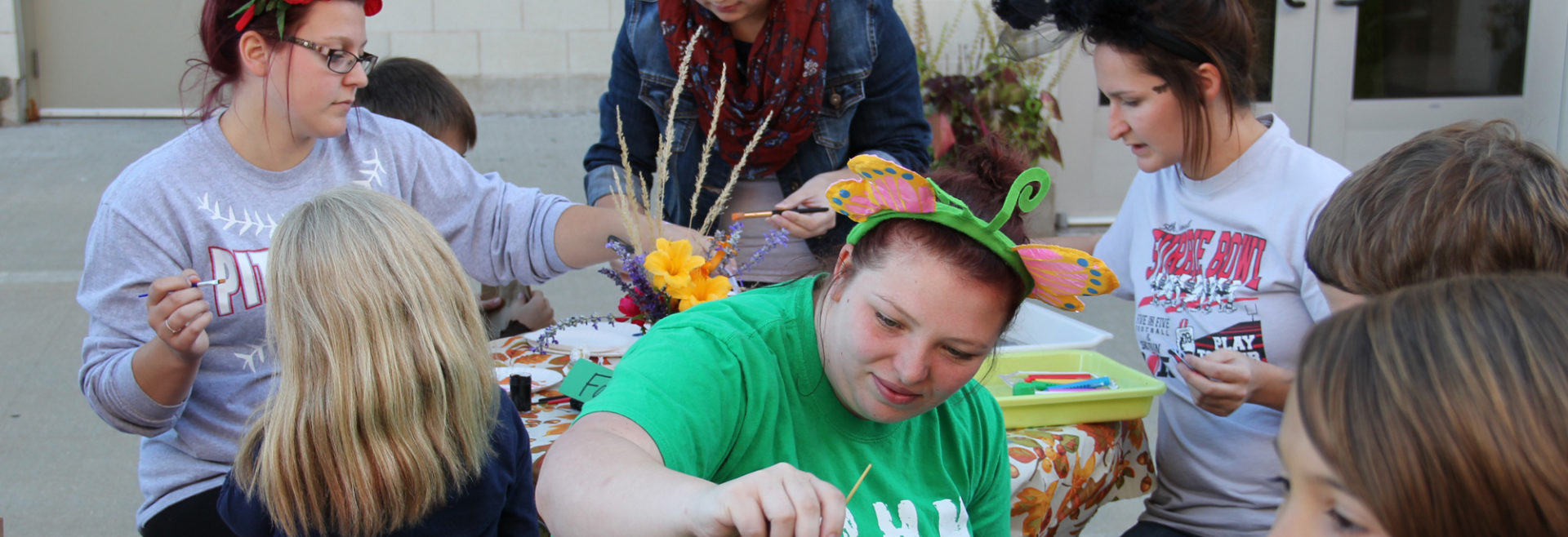| Any course with SOC or PSY prefix. |
| Various |
SOC Electives |
Details |
3 |
| All courses with SOC prefix. |
| SOC 101 |
Introduction to Sociology |
Details |
3 |
| This course is an introduction to sociology as a way of understanding the world and how it applies to everyday life. Major theoretical perspectives and concepts are presented including socialization, culture, the social construction of knowledge, social control and deviance, inequality, race and ethnic relations, poverty, and the sociological imagination. IAI: S7 900. |
| Prerequisites: |
(none) |
|
| SOC 111 |
Social Problems |
Details |
3 |
| This course describes social problems facing the United States today and identifies how these problems impact and are impacted by our institutions and culture. Students will learn how to interpret social problems by looking at them through the lens of sociological theory. The course examines the causes of various social problems, the effects of these problems on society and possible remedies or policies. IAI: S7 901. |
| Prerequisites: |
(none) |
|
| SOC 195 |
Special Topics in Social Science |
Details |
1-4 (Varies) |
| Deals with current topics in social science not covered in other courses. Topics will vary with needs, interests, and goals of the student and instructor. No topic will be offered more than twice within three years. May be repeated three times with different topics. Topics to be listed on student's permanent academic record. |
| Prerequisites: |
Consent of department |
|
| SOC 212 |
Human Sexuality |
Details |
3 |
| This class will examine the social psychological and sociological aspects of human sexuality. Theories, perspectives, and data from the scientific field of sexuality will be discussed. The major goal is for students to gain a greater understanding of their own bodies and arousal, sexual orientation and sexual thoughts, feelings, beliefs, and behaviors, which will benefit them in their lives and decision making. (Same as PSY 212) |
| Prerequisites: |
(none) |
|
| SOC 222 |
Sociology of Diversity |
Details |
3 |
| This course will focus on the social construction of race and its impact on racial identities and relations. The historical structural foundations of racial inequality in contemporary society will be addressed as well as group relations of other minority groups, including religious and sexual minorities. Students will explore the social implications of difference with particular reference to issues of race, ethnicity, religion, class and gender. Key components of cross-cultural theories, methods and research as they relate to living and working in a multicultural society will also be examined. IAI: S7 903D. |
| Prerequisites: |
(none) |
|
| SOC 224 |
Marriage and the Family |
Details |
3 |
| The social context of marriage and family patterns in the current American society; nature, purpose and obligations of marriage and family. IAI: S7 902. |
| Prerequisites: |
(none) |
|
| SOC 243 |
Introduction to Social Work |
Details |
3 |
| Introduction to basic methodologies of social work intervention in problem situations at individual, group and community levels. |
| Prerequisites: |
(none) |
|
| SOC 295 |
Advanced Special Topics in Social Science |
Details |
1-4 (Varies) |
| Deals with current topics in social science not covered in other courses. Topics will vary at discretion of the instructor. No topic will be offered more than twice within three years. May be repeated with different topics to maximum of four credit hours. Topics to be listed on student's permanent academic record. |
| Prerequisites: |
Consent of department |
|
|
| Various |
PSY Electives |
Details |
3 |
| All courses with PSY prefix. |
| PSY 101 |
Introduction to Psychology |
Details |
3 |
| Basic introduction to the major areas of psychology--the study of behavior and the mind. Areas of emphasis include human development, personality theory, learning, thinking, stress and motivation, mental illnesses, and biological and social aspects of behavior. Course will combine research with real life application throughout. IAI: S6 900. |
| Prerequisites: |
(none) |
|
| PSY 108 |
Applied Psychology |
Details |
3 |
| Practical applications of the psychological principles that lead to learning efficiency, social adjustment, motivation, interpersonal skills, and success-oriented attitudes |
| Prerequisites: |
(none) |
|
| PSY 123 |
Career Management |
Details |
1 |
| Strategy and skills for developing a career management program, particularly self-assessment, decision making, life planning, and communication skills, for the individual entering or reentering the job market, moving within occupations, or changing occupations. |
| Prerequisites: |
(none) |
|
| PSY 145 |
Human Relations in the Workplace |
Details |
3 |
| Introduction to the application of guidelines for the field of human relationships in the workplace. The course will examine the information and guidelines to promote effective functioning in the workplace. Topics covered will include diversity in the workplace, groups and organizations, ethics, productivity, teamwork communication, and motivation. Also emphasized will be workplace attitudes for job satisfaction, interpersonal relations, dealing with stress and discrimination, and career choice planning. |
| Prerequisites: |
(none) |
|
| PSY 195 |
Special Topics in Psychology |
Details |
1-4 (Varies) |
| Deals with current topics in psychology not covered in other courses. Topics will vary at discretion of the instructor. No topic will be offered more than twice within three years. May be repeated with different topics to maximum of four credit hours. Topics to be listed on student's permanent academic record. |
| Prerequisites: |
Consent of department |
|
| PSY 201 |
Educational Psychology |
Details |
3 |
| A study of the application of the principles of psychology to the field of education and a review of educational research in the areas of motivation, intelligence, measurement, evaluation, the learning process, learning styles, and the impact of culture in education. Observational experiences may be included. |
| Prerequisites: |
PSY 101 |
|
| PSY 202 |
Child Psychology |
Details |
3 |
| A psychological examination of human development from conception through adolescence. Topics include interaction of diverse influences of biological factors, individual characteristics, and the environment in relation to human growth and development. IAI: S6 903. |
| Prerequisites: |
PSY 101 |
|
| PSY 203 |
Adolescent Psychology |
Details |
3 |
| This course provides a detailed examination of the developmental period of adolescence, including cognitive, social, personality and psychosocial developmental milestones. Physical maturation and the emergence of new social references are discussed. IAI: S6 904. |
| Prerequisites: |
PSY 101 |
|
| PSY 205 |
Psychology of Adulthood and Aging |
Details |
3 |
| Introduction to the changes that occur from early adulthood through the end of the lifespan. Topics include: physical and neurological changes that occur throughout adulthood; career choice and development; mate selection and marriage; conventional and nonconventional families; theories of adult personality development; mid- and late-life transitions; mental health in adulthood; and dying, death and bereavement. |
| Prerequisites: |
PSY 101 |
|
| PSY 212 |
Human Sexuality |
Details |
3 |
| This class will examine the social psychological and sociological aspects of human sexuality. Theories, perspectives and data from the scientific field of sexuality will be discussed. The major goal is for students to gain a greater understanding or their own bodies and arousal, sexual orientation and sexual thoughts, feelings, beliefs and behaviors, which will benefit them in their lives and decision making. (Same as SOC 212) |
| Prerequisites: |
(none) |
|
| PSY 221 |
Social Psychology |
Details |
3 |
| A study of the impact of social factors on individual and group behavior, including attitudes, behavior, and motivation. (Same as SOC 221.) IAI: S8 900. |
| Prerequisites: |
PSY 101 or SOC 101 |
|
| PSY 224 |
Sport Psychology |
Details |
3 |
| This course will introduce students to research concepts and theories relating to sport psychology. The content will include an overview of the history and development of sport psychology and expose students to the foundational concepts of the field. The course material will also include an overview of psychological assessment, mental skills training, performance enhancement, injury recovery, and participation satisfaction. The course will examine how this knowledge can be applied to a wide range of settings and participants, such as coaches, parents and athletes, while addressing varying levels of ability (from recreational to elite sports participation). (Same as HPR 224) |
| Prerequisites: |
(none) |
|
| PSY 233 |
Developmental Psychology |
Details |
3 |
| A study of human development from conception across the life span to death. Attention will be given to physical, cognitive, emotional and social aspects of development. IAI: S6 902. |
| Prerequisites: |
PSY 101 |
|
| PSY 238 |
Abnormal Psychology |
Details |
3 |
| A study of mental illness including the causes, characteristics, progression and treatment of mental illness. IAI: PSY 905. |
| Prerequisites: |
PSY 101 |
|
| PSY 250 |
Psychology of Personality |
Details |
3 |
| A study of the major theories, schools, and systems of psychology relating to the growth and structure of individual human personality. |
| Prerequisites: |
PSY 101 |
|
| PSY 295 |
Advanced Special Topics in Psychology |
Details |
1-4 (Varies) |
| Deals with current topics in psychology not covered in other courses. Topics will vary at discretion of the instructor. No topic will be offered more than twice within three years. May be repeated with different topics to maximum of four credit hours. Topics to be listed on student's permanent academic record |
| Prerequisites: |
Consent of department |
|
|
|

